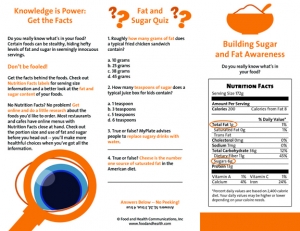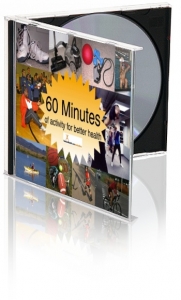5 Things We Can Learn from Olympic Athletes
Have you been watching the Olympics this year? It was sad to see them end on Sunday? No matter what the event, there's a lot to learn from the athletes -- before, after, and during the competition. Scroll below for a free motivational handout.And you don't have to be an Olympian to apply some of those lessons to your own life.Take a look at the 5 big things we learned from Olympic athletes this year. They are great lessons for your clients and students. And even yourself. We learned a lot, too. Olympic Lesson #1: Be Active, Every Day Olympic athletes follow a rigorous training schedule, and many exercise multiple times per day. The consistency and time devoted to the workouts really pay off in the competition. In fact, Ted Ligety, who won a gold medal in the giant slalom this year, trains for 5-6 hours a day. And that's just in the off season! The article, Ted Ligety Knows No Off-Season, explains, "Training is a year-round obligation, whether on the road or not."Can you implement a similar program on a smaller scale? You certainly don't need to train for upwards of 6 hours a day, but can you set a workout schedule that offers a bit of a challenge? Make a real commitment to exercise consistently!Olympic Lesson #2: Get Back UpThe injury and tragedy comeback stories in the Olympics are sure to inspire, so make sure to take those lessons to heart. Follow the lead of these amazing athletes, at whatever scale matters to you. If you have a bad day, miss a workout, or fail to stick to your program, acknowledge the frustration and then find a way to get back up and keep going.Don't give up!Did Stephan Groothuis give up as he injured his Achilles tendon and fought depression? No, and he went on to win a gold medal in men's speed skating (1,000 meter) in Sochi 2014!Did Steven Holcomb give up when he injured his calf just one day before this year's two-man Olympic bobsled competition? No. He competed anyway, helping to earn his team a bronze medal and breaking the USA's 62-year medal drought in that event!Let these athletes inspire you. If something goes wrong in your training plans, don't let it derail you for long. Fight through the adversity and keep trying your best.
Olympic Lesson #1: Be Active, Every Day Olympic athletes follow a rigorous training schedule, and many exercise multiple times per day. The consistency and time devoted to the workouts really pay off in the competition. In fact, Ted Ligety, who won a gold medal in the giant slalom this year, trains for 5-6 hours a day. And that's just in the off season! The article, Ted Ligety Knows No Off-Season, explains, "Training is a year-round obligation, whether on the road or not."Can you implement a similar program on a smaller scale? You certainly don't need to train for upwards of 6 hours a day, but can you set a workout schedule that offers a bit of a challenge? Make a real commitment to exercise consistently!Olympic Lesson #2: Get Back UpThe injury and tragedy comeback stories in the Olympics are sure to inspire, so make sure to take those lessons to heart. Follow the lead of these amazing athletes, at whatever scale matters to you. If you have a bad day, miss a workout, or fail to stick to your program, acknowledge the frustration and then find a way to get back up and keep going.Don't give up!Did Stephan Groothuis give up as he injured his Achilles tendon and fought depression? No, and he went on to win a gold medal in men's speed skating (1,000 meter) in Sochi 2014!Did Steven Holcomb give up when he injured his calf just one day before this year's two-man Olympic bobsled competition? No. He competed anyway, helping to earn his team a bronze medal and breaking the USA's 62-year medal drought in that event!Let these athletes inspire you. If something goes wrong in your training plans, don't let it derail you for long. Fight through the adversity and keep trying your best. Olympic Lesson #3: Fuel RightYou won't find Olympic athletes eating a steady diet of foods laden with sodium, saturated fat, added sugars, etc. All the hard work they do requires just the right fuel, which in turn means that most Olympians eat healthfully, all day, every day. Their plans definitely don't include skipping meals regularly or avoiding the nutrients they need.In fact, the U.S. Olympic Committee puts together a team of professional nutrition specialists, who then offer informational materials to Olypmic athletes, coaches, and parents. The information focuses on eating guidelines and a sport-specific diet. View some of the offerings for yourself at Nutrition Resources for Olympic Athletes, from Team USA.According to How to Train Like an Olympian from Forbes, "athletes training at one of the U.S. Olympic Training Center’s facilities also frequently meet with a team -- usually including a nutritionist, exercise physiologist, sports medicine specialist and coach -- to discuss their strengths and weaknesses and accordingly tweak their diets."Follow the lead of these amazing athletes and find the right fuel for your life. Look for options that are nutrient-dense and free of empty calories. Talk with a dietitian about finding an eating plan that works for you.Olympic Lesson #4: SleepDo you think athletes training for and competing in the Olympics let themselves run low on sleep? Absolutely not. According to that same Forbes article, "if you want to train like an Olympian, be prepared to go to bed at the same time as the kids. Athletes aiming for the games need to sleep anywhere from eight to 10 hours a night, often followed by a 30- to 90-minute siesta, says [Terrence] Mahon [the head coach for Team Running USA]. Resting is crucial because it gives the body a chance to rebuild tissue and muscle that’s been broken down during training."
Olympic Lesson #3: Fuel RightYou won't find Olympic athletes eating a steady diet of foods laden with sodium, saturated fat, added sugars, etc. All the hard work they do requires just the right fuel, which in turn means that most Olympians eat healthfully, all day, every day. Their plans definitely don't include skipping meals regularly or avoiding the nutrients they need.In fact, the U.S. Olympic Committee puts together a team of professional nutrition specialists, who then offer informational materials to Olypmic athletes, coaches, and parents. The information focuses on eating guidelines and a sport-specific diet. View some of the offerings for yourself at Nutrition Resources for Olympic Athletes, from Team USA.According to How to Train Like an Olympian from Forbes, "athletes training at one of the U.S. Olympic Training Center’s facilities also frequently meet with a team -- usually including a nutritionist, exercise physiologist, sports medicine specialist and coach -- to discuss their strengths and weaknesses and accordingly tweak their diets."Follow the lead of these amazing athletes and find the right fuel for your life. Look for options that are nutrient-dense and free of empty calories. Talk with a dietitian about finding an eating plan that works for you.Olympic Lesson #4: SleepDo you think athletes training for and competing in the Olympics let themselves run low on sleep? Absolutely not. According to that same Forbes article, "if you want to train like an Olympian, be prepared to go to bed at the same time as the kids. Athletes aiming for the games need to sleep anywhere from eight to 10 hours a night, often followed by a 30- to 90-minute siesta, says [Terrence] Mahon [the head coach for Team Running USA]. Resting is crucial because it gives the body a chance to rebuild tissue and muscle that’s been broken down during training." Olympic Lesson #5: Go for the Gold!Even if a medal isn't in your future, keep your eyes on the prize. Set a goal for yourself and strive to reach it. Make reminders for those times when you need a pick-me-up and do what it takes to keep your goals in view.Remember, the ultimate prize for a healthful lifestyle isn't a gold medal or a pile of cash, it's something even greater. Your health.For More Information:
Olympic Lesson #5: Go for the Gold!Even if a medal isn't in your future, keep your eyes on the prize. Set a goal for yourself and strive to reach it. Make reminders for those times when you need a pick-me-up and do what it takes to keep your goals in view.Remember, the ultimate prize for a healthful lifestyle isn't a gold medal or a pile of cash, it's something even greater. Your health.For More Information:
- Nutrition Resources for Olympic Athletes -- Team USA
- How to Train Like an Olympian -- Forbes
- Ted Ligety Knows No Off-Season -- SkiNet.com
- 1000m Gold, Silver Medalists Overcome Adversity to Get Their Olympic Moments -- NBC Olympic Talk
- Holcomb Ends 62-Year U.S. Drought -- ESPN
There are tons of resources to help you take these lessons to heart and easily apply them in your daily life. Which of the following will help you succeed?

 Here is a free handout:5 Lessons From Olympic Athlete's Handout
Here is a free handout:5 Lessons From Olympic Athlete's Handout
